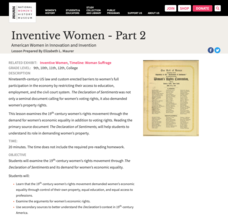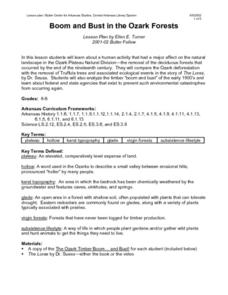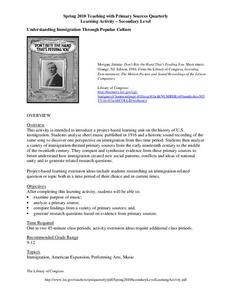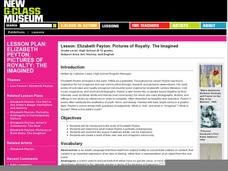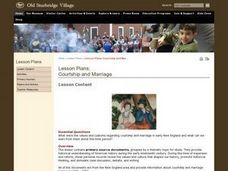National Woman's History Museum
Inventive Women - Part 2
The Declaration of Independence was published in 1776. The Declaration of Sentiments and Resolutions, modeled after the Declaration of Independence, was drafted and read by Elizabeth Cady Stanton at the Seneca Falls Convention in 1848....
Alabama Department of Archives and History
Nellie Bly to Dr. Peter Bryce: 19th Century Asylum Reform
What kind of treatment could a patient expect in an asylum during the 1800's? The abusive and neglectful conditions in 19th century asylums are the focus of a lesson that examines the work of reformers Nellie Bly, Dorothea Dix, and Dr....
National Woman's History Museum
Inventive Women - Part 1
While a woman didn't invent the parasol, three women received patents for their improvements to the original design of umbrellas. In the first of a two-part series on inventive women, class members investigate the patent system to...
Curated OER
Reading Comprehension 7: Level 12
A passage about the changing role of home economists provides the text for a reading comprehension strategies worksheet. Learners must summarize, draw inferences, identify the main idea, and use context clues to determine the meaning of...
American Evolution
Virginia Runaway Slave Ads
What does an ad reveal about a culture, or about the values of its intended audience? Class members examine a series of runaway slave ads—one of which was written by Thomas Jefferson—and consider what these primary source documents...
American Institute of Physics
African American Inventors in History
A two-part lesson introduces young historians to the work of famous African American inventors. Groups first research and develop a presentation of an inventor that includes biographical information and information about one of their...
Curated OER
Boom and Bust in the Ozark Forests
Here is a hard-hitting, cross-curricular activity on the effects that the deforestation of the Ozark forests in the 19th century had on the people, animals, and ecosystems of the area. The Dr. Seuss book The Lorax is used as a way of...
Curated OER
Slave Narratives: Constructing U.S. History Through Analyzing Primary Sources
Learners access oral histories that contain slave narratives from the Library of Congress. They describe the lives of former slaves, sample varied individual experiences and make generalizations about their research in journal entries.
Brooklyn Museum
HIDE/SEEK: Difference and Desire in American Portraiture
Visual arts lessons don't always mean the children need to make art. Here, they will practice using their visual literacy skills to analyze four images through the compare and contrast method. The first two images deal with gender...
Library of Congress
Understanding Immigration Through Popular Culture
Class members are introduced to a project-based learning unit on US immigration with an activity that asks them to analyze sheet music and other primary source materials to uncover issues raised by immigration.
Digital Public Library of America
The American Whaling Industry
When thinking about the American whaling industry most imagine Moby Dick and Nantucket sleigh rides, harpoons and scrimshaw, whale-oil lamps and baleen in women's corsets. But it may come as a surprise that the industry was also...
Curated OER
Do You Know the Story of Pomp?
Students examine and read about Pomp, the infant son of Sacagawea. They research the Lewis and Clark expedition, create a storyboard presenting important events, and design a Powerpoint presentation.
Curated OER
Pioneer Values in Willa Cather's My Antonia
Included in this resource are a variety of activities to do while reading Willa Cather's My Antonia. The activities, which range from mapping out Nebraska to writing activities about pioneer living, are all designed with one guiding...
Curated OER
William Apess and the Mashpee "Revolt" of 1833
Prompt your class with the following question: What was the status of American Indians in Massachusetts during Jackson's presidency? To answer this question, class members will read a series of primary source documents (attached),...
Curated OER
Haven't I Seen You Somewhere Before?
High schoolers discover the true meaning of karma and the related concept of samsara by reading the Jataka Tales. Learners work in groups to become familiar with one form of Buddhist storytelling and examine how Jataka Tales are used as...
Curated OER
Making a Six-pointed Star
In this polygon worksheet, students identify and create a six-pointed star by completing 6 steps. First, they use a compass to trace a circle with a given radius. Then, students draw a point on circumference of the circle and place the...
Curated OER
Lesson: Elizabeth Peyton: Artist's Community: The Real
What is real or imagined? The lines of beauty reality, and imagination are blurred in Elizabeth Peyton's portraits of her community. Learners analyze her use of artistic technique in conveying real and imagined communities. They then use...
Curated OER
Lesson: Elizabeth Peyton: Pictures of Royalty: The Imagined
Elizabeth Peyton is an artist who creates images of people (often famous) that she doesn't personally know. These images become part of her imagined community. Learners analyze her work, her community of imagined friends, and then create...
Library of Congress
The Conservation Movement at a Crossroads: The Hetch Hetchy Controversy
Should wilderness areas be preserved or managed? Class members examine primary source documents, including lecture notes, articles, essays and congressional records to better understand the Hetch Hetchy controversy that created a split...
Curated OER
Georgia CRCT - 7th Grade Language Arts Quiz
Writing conventions are the focus of this standardized practice test. Designed for the Georgia Criterion-Referenced Competency Test (CRCT), these fifteen questions address grammar (capitalization, parts of speech, homonyms) and writing...
Curated OER
Courtship and Marriage
Students research the concept of courtship and marriage as it pertains to early New England and explore the values and culture that shaped our history. In this courtship and marriage lesson, students examine primary source documents that...
Middle Tennessee State University
John Brown: Hero or Villain?
"Love it or leave it." "You're either for us or against us." Rhetoric and it's polarizing effects are the focus of a lesson that uses John Brown's attack on Harper's Ferry as an exemplar. Groups examine primary source documents,...
Curated OER
Sentence Completion: Low-Advanced SAT Level
Imagine a sentence completion worksheet that includes a detailed explanation for how to determine the correct response! Here it is. The resource can be used for independent practice, as a warm-up, for group discussion, or as part of a...
Curated OER
Sentence Completion 15: Low-Advanced SAT Level
Do your pupils need extra practice with sentence completion? Learners will have to employ a variety of strategies to answer correctly the six multiple-choice prompts on the worksheet. A richly detailed answer/explanation key is included....
Other popular searches
- Nineteenth Century England
- Melodrama Nineteenth Century
- Nineteenth Century Reforms
- Nineteenth Century Russia
- Nineteenth Century Clothing
- Nineteenth Century Virginia
- Nineteenth Century Ireland
- Nineteenth Century America


